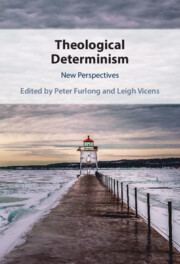Book contents
- Theological Determinism
- Theological Determinism
- Copyright page
- Contents
- Contributors
- Acknowledgments
- Introduction
- Chapter 1 Theological Determinism and Creation
- Chapter 2 Am I Here by Accident?
- Chapter 3 You Searched Me and Knew Me
- Chapter 4 Fatalism and Some Varieties of Contrastive Explanation
- Chapter 5 Divine Transcendence
- Chapter 6 The Incompatibility of Universal, Determinate Divine Action with Human Free Will
- Chapter 7 Natural Compatibilists Should Be Theological Compatibilists
- Chapter 8 An Argument for Theological Incompatibilism
- Chapter 9 Human Freedom and the Inevitability of Sin
- Chapter 10 Hard Theological Determinism and Divine Forgiveness Are Incompatible
- Chapter 11 Moral Luck, Free Will Theodicies, and Theological Determinism
- Chapter 12 Divine Determinism and Gratitude for Sins
- Chapter 13 The Problem of Trust
- Chapter 14 Toward a Reactive Attitudes Theodicy
- Chapter 15 Christ in Gethsemane
- Bibliography
- Index
Chapter 9 - Human Freedom and the Inevitability of Sin
Published online by Cambridge University Press: 30 September 2022
- Theological Determinism
- Theological Determinism
- Copyright page
- Contents
- Contributors
- Acknowledgments
- Introduction
- Chapter 1 Theological Determinism and Creation
- Chapter 2 Am I Here by Accident?
- Chapter 3 You Searched Me and Knew Me
- Chapter 4 Fatalism and Some Varieties of Contrastive Explanation
- Chapter 5 Divine Transcendence
- Chapter 6 The Incompatibility of Universal, Determinate Divine Action with Human Free Will
- Chapter 7 Natural Compatibilists Should Be Theological Compatibilists
- Chapter 8 An Argument for Theological Incompatibilism
- Chapter 9 Human Freedom and the Inevitability of Sin
- Chapter 10 Hard Theological Determinism and Divine Forgiveness Are Incompatible
- Chapter 11 Moral Luck, Free Will Theodicies, and Theological Determinism
- Chapter 12 Divine Determinism and Gratitude for Sins
- Chapter 13 The Problem of Trust
- Chapter 14 Toward a Reactive Attitudes Theodicy
- Chapter 15 Christ in Gethsemane
- Bibliography
- Index
Summary
This chapter explores the constraints that a commitment to the inevitability of sin places on an understanding of the existence and nature of human freedom, and the implications of this understanding for debates about divine providence. It is argued, first, that the New Testament univocally attests to the inevitability of sin, and second, that given this biblical witness, Christians should not be swayed by one reason commonly given for rejecting theological determinism: in order to preserve libertarian freedom for humans at large. Still, considerations regarding the inevitability of human sin leave untouched another common argument against theological determinism: that it makes God the author of sin. Considerations of the inevitability (and culpability) of sin, on the one hand, and concerns about divine authorship of sin, on the other, might push one toward an uncommon combination of compatibilism and theological indeterminism. However, given the apparent unfairness of punishing individuals for sins they could not have avoided committing, a position between standard compatibilism and free will skepticism is tentatively endorsed.
Keywords
- Type
- Chapter
- Information
- Theological DeterminismNew Perspectives, pp. 150 - 164Publisher: Cambridge University PressPrint publication year: 2022
- 1
- Cited by

